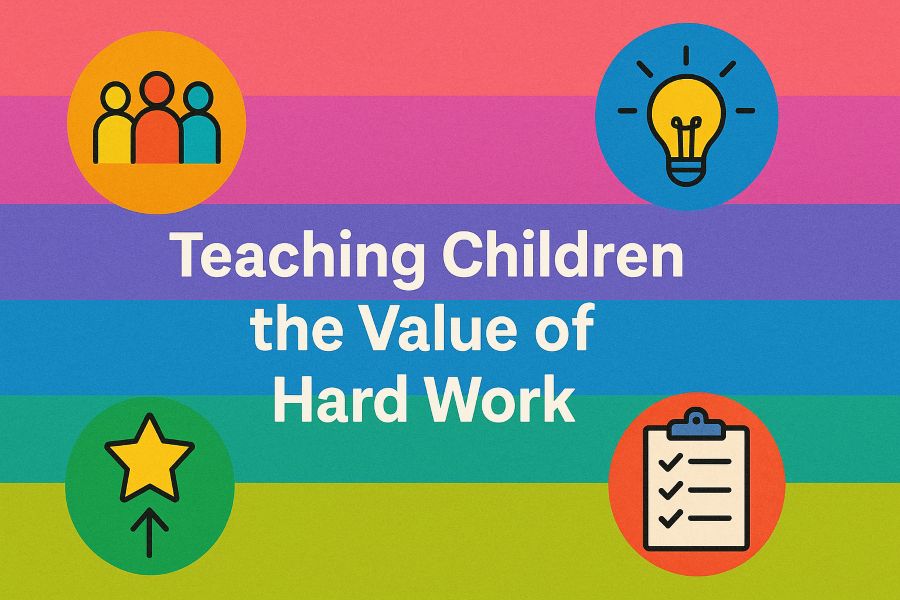Teaching Children the Value of Hard Work Through Age-Appropriate Jobs

Getting your kids to understand the value of hard work isn’t about turning them into miniature adults overnight. It’s about gradually introducing them to the idea that effort matters, and that contributing to family life feels good. Whether you’re a parent or a foster carer, this journey looks different for every child.
The beauty of teaching work ethic early? It sticks. Children who grow up understanding that effort leads to results tend to bounce back from setbacks more easily. They solve problems instead of giving up.
Starting Small: Ages 3-6
Little ones are basically tiny humans desperate to help with everything. Use this to your advantage! At three or four, your child probably wants to “help” you make the bed (even if it means you’ll be redoing it later). Let them.
Sorting socks by colour becomes a game. Putting toys in the right boxes feels like an achievement. Setting the table with plastic plates? They’re practically running a restaurant in their minds.
Young children don’t distinguish between work and play the way we do. Watering plants with a miniature watering can is pure joy to them. Raking leaves turns into jumping in piles. The trick is keeping that enthusiasm alive while they’re learning.
Don’t worry about perfection at this stage. Your five-year-old’s idea of “tidy” might not match yours, but they’re learning something far more valuable than neat edges on bedsheets.
Building Responsibility: Ages 7-11
This age group can handle proper responsibilities. Real ones. Feeding the family pet isn’t just a chore, it’s caring for another living being. Loading the dishwasher teaches them that meals don’t magically clean themselves.
Pocket money becomes interesting here. Instead of just handing over cash, link it to effort. Not every single task needs payment, but bigger jobs like washing the car or helping with garden maintenance? That’s earned money, and they know it.
Cooking together works brilliantly too. An eight-year-old can measure flour, crack eggs (with varying degrees of shell removal!), and stir cake mixture. When they serve something that they’ve helped create, the pride on their faces is unmistakable.
For foster carers working with agencies like Foster Care Associates, these routine activities become particularly meaningful. Many foster children thrive on the predictability of household responsibilities. It gives them a sense of belonging and purpose that some might never have experienced before.
Developing Independence: Ages 12-16
Teenagers present their own unique challenges. They want independence but still need guidance. This balancing act becomes easier when you give them real responsibilities that mirror adult life.
Managing their own laundry from dirty clothes to folded and put away? That’s a life skill they’ll need at university. Cooking entire meals for the family teaches planning, timing, and budget awareness. Some teenagers even enjoy taking ownership of specific areas like keeping the bathroom spotless or managing the family’s weekly food shop.
Part-time jobs work well for older teens, but moderation matters. School comes first, always. A Saturday job at a local shop or helping neighbours with gardening provides real-world experience without overwhelming their studies.
Technology isn’t the enemy here either. Teenagers might manage family calendars, research holiday destinations, or help track household expenses using apps. These digital skills complement rather than replace traditional work values.
Creating Positive Work Environments
Your attitude shapes everything. If you treat household tasks as annoying burdens, your children will too. Frame them as family contributions instead. When you work alongside your children, especially when they’re learning something new, it becomes quality time rather than a chore.
Be specific about expectations. Telling a seven-year-old to “help with dishes” isn’t as useful as showing them exactly how to load cutlery safely and why it matters.
Patience pays off, though it will probably be tested regularly. Tasks that take you five minutes might require twenty when you’re teaching. But watching your child develop competence and confidence? Worth every extra minute.
Praise effort as much as results. Your teenager might cook a brilliant dinner but leave flour handprints on every surface. Acknowledge the cooking success before addressing the cleanup. This balanced approach keeps motivation high while encouraging improvement.
Adapting for Different Needs
Every child learns differently. Some love detailed lists and structured routines. Others work better with flexible arrangements that fit their natural energy patterns.
Children with additional needs often require modified approaches, but the core principle remains the same. Breaking tasks into smaller steps, using visual guides, or allowing extra time ensures everyone can experience the satisfaction of meaningful contribution.
Foster children arrive with vastly different experiences. Some have been forced to shoulder adult responsibilities far too young. Others have had little opportunity to develop basic self-care skills. Understanding their background helps you pitch expectations appropriately while building confidence gradually.
Building Lifelong Values
Teaching children to value hard work creates ripple effects that last decades. When you consistently show that effort matters, that everyone has a role in family life, and that work can be satisfying rather than just obligatory, you’re shaping future adults who tackle challenges head-on.
The skills they develop, like sticking with difficult tasks, figuring out solutions, and managing time effectively will serve them well in every area of life. More importantly, they learn that contributing to something bigger than themselves feels genuinely rewarding. That’s a lesson worth teaching, whatever their age.



